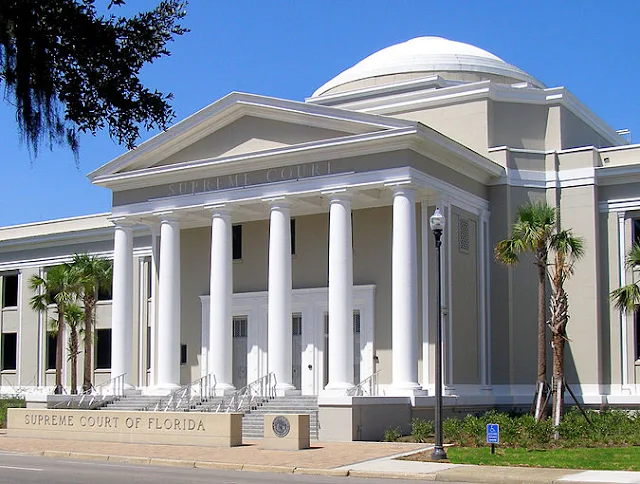Florida Supreme Court Rules Judicial Candidates Can Call Themselves Conservative
 |
| Supreme Court of Florida. Credit Wiki Commons |
TALLAHASSEE, Florida - The Florida Supreme Court unanimously ruled on Thursday that judicial candidates can refer to themselves as "conservative" without violating judicial campaign rules that prohibit the use of partisan labels.
St. Johns County Judge Casey L. Woolsey is set to receive a public reprimand following findings and recommendations by the Judicial Qualifications Commission (JQC). The reprimand stems from two incidents during her 2022 campaign for judicial office.
The JQC's report found that, in the first incident, Judge Woolsey approved a misleading social media post suggesting she had raised $100,000 from third parties, while the amount included a $50,000 loan from Woolsey herself.
In the second incident, she left a recorded voicemail for a voter identifying herself as a conservative, which the JQC found to be inappropriate political activity:
“Hey, sorry I missed you. My name is CaseyWoolsey and I am calling because I’m running for County Court Judge here in St. Johns County. So, I just wanted to introduce myself and ask if you would consider voting for me when you’re filling in your mail-in ballots. I am a conservative, and my website is . . . .”
Judge Woolsey and the JQC have stipulated that her actions in the first incident violated judicial conduct rules. Specifically, the misleading post violated Canon 7A(3)(e)(ii), which prohibits judicial candidates from misrepresenting facts. This aspect of the findings and recommendation was approved by the Supreme Court without further discussion.
However, the Supreme Court disagreed with the JQC's finding that Woolsey's voicemail referring to herself as a conservative breached Canon 7.
The Supreme Court ruled that describing oneself as a conservative does not inherently indicate partisanship or compromise judicial impartiality.
"To describe oneself as a “conservative” does not signal bias (pro or con) toward anyone or on any issue. Nor does it reasonably call into doubt the fairness of any future judicial proceeding involving the candidate," the Supreme Court held.
"In political and legal discourse, “conservative” is an indeterminate word of many meanings and connotations. Even if we assume that a candidate might use the word “conservative” to associate herself with certain unstated views or personal dispositions, this Court has already observed that “our judicial code does not prohibit a candidate from discussing his or her philosophical beliefs.”
